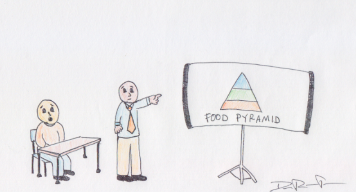Departments try to make students more aware of their health

November 22, 2016
The most important part of high school might seem like grades, but teens should be keeping up with healthy habits as well.
“Often students come into our class not knowing a lot about nutrition or how to take care of themselves,” wellness teacher Frank Consiglio says.
Nutrition and exercise can impact many aspects of a teenager’s life. It can affect energy, mental health and the motivation to go through with activities and projects. It also directly affects your physical health. This is just one of the reasons that ETHS has tried to up awareness for the issue.
The wellness curriculum has implemented nutrition into their curriculum. The curriculum actually tries to fit in many different parts of healthy living into the semester of instruction. Mental health, stress management, nutrition, fitness, drug and alcohol education, diseases, sexuality, and even more. And as obesity has become such a prevalent issue for young people in the United States, nutrition is becoming a top priority. So is the relevance of the nutrition unit in Wellness. When students walk into class the first day of the semester, they usually know little to nothing about nutrition. Once they walk out, the hope is that they are prepared for the rest of their lives.
“In the nutrition unit, we can take what we learn and directly apply it outside of class,” sophomore Grace Prendergast says.
Whether it is learning about calories, different food groups, or exercise, wellness tries to incorporate many different aspects of nutrition and healthy living into their mindsets. Along with new regulations put on school meals to help them have less calories, fats, and sugar. But some students believe that there should be a little more to the curriculum.
“I wish there was a cooking or meal plan section of the nutritional unit where kids can learn to incorporate healthy behaviors at home,” junior Jack Caldwell explains.
According to the CDC, obesity as a teen can lead to very serious health issues as adults. They are more likely to be obese as adults, and therefore more susceptible to heart disease, cancer, diabetes, and arthritis. These reasons have caused ETHS to try and make the education surrounding this disease as thorough and helpful as positive.
“We are trying to teach students life skills. And we are hoping that the knowledge given to these kids is put to use,” Consiglio explains.
As obesity is on the rise around the country, students can be content knowing that the school is taking appropriate measures to prevent, and educate, about it.







